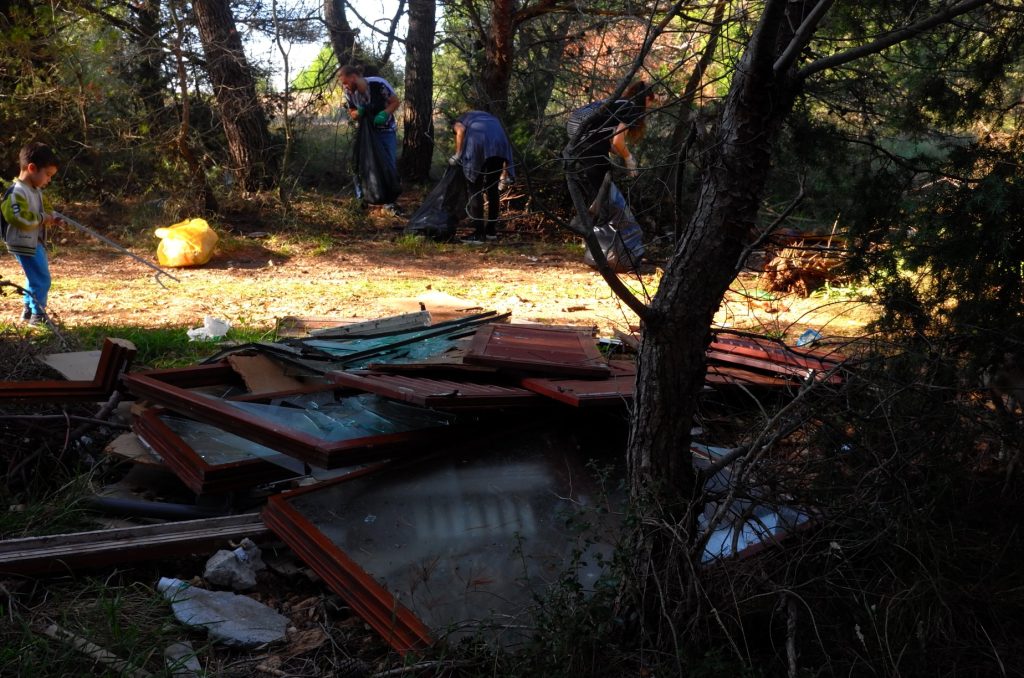June 19, 2020 — As Dalmatia’s housing footprint expands faster than its infrastructure, locals relieve the swell of sewage and construction scraps however they can. The result: much of Dalmatia’s hinterland is brimming with crap.
A manmade pool of festering feces sits just 10 kilometers outside of Zadar, near a town adjacent to the airport called Babindub. Excavation equipment dug the hole; trucks laid the gravel leading to it. Now septic tank cleaning services empty their wares there.
The smell of raw sewage and garbage permeates the hot air as the pond grows with every new deposit of feces, then recedes as the summer sun evaporates the water.
Authorities wish they could find a better solution, but the residential market is growing faster than government-funded infrastructure can keep up.
Croatia’s tourism boom set off a cascade of changes along a sleepy coast which once housed merchant seamen, farmers and fishing villages.
Old seaside stone houses transformed into private accommodations for tourists. Many opted for gut renovations, carting off wheelbarrows-worth of support beams, stones and brick. Second or even third stories were added to increase capacity and available space.
Septic tanks and sewer lines meant for humble single-family homes were now inundated three months a year with constant toilet flushes and frequent showers of multi-apartment dwellings. Residential zones expanded as well, sparking building booms on property once reserved for sheep and a rotation of crops.
The local infrastructure, already aging poorly, could hardly handle the new annual spike in water use and refuse. Local authorities often did not branch existing sewage lines out to connect newly-built homes, forcing most new houses to include septic tanks that must be emptied by municipal services.
Septic tanks, which have been known to overfill at inopportune times during the tourism season, posed a unique problem. Costly municipal emptying services fuel a black market for poop removal. Many homeowners with overflowing tanks found a solution in the backcountry roads and abandoned parcels on the outskirts of their town. Police in Zadar recently caught three men allegedly dumping household wastewater off a side road. The practice is so common, authorities are trying to control the situation somehow until infrastructure catches up.
Hence, Babindub’s crap hole.
Local authorities in the neighboring municipalities of Bibinje and Sukosan on June 1 approved the Babindub hole’s creation, according to Zadarski List. The governments decided to use the hole as a “temporary” holding place for feces, promising to treat the festering pool with enzymes to break the crap down.
The hole itself has instead turned into an orgy of toilet tissue and pests, with a pool of feces expanding and contracting with new deposits and subsequent evaporation, as if it were a tide of poop. Locals are clearly peeved, but authorities say they are short of options.
“I would be happiest if we had a solution to this problem, but unfortunately we do not have it,” Stipe Bugarija, a member of the local Sewage Board, told Zadarski List. “In order to reduce the damage, we procured enzymes with which the workers spray the pit in order to decompose it faster and faster. If anyone can solve this, let them solve it, because we have no way.”
Bibinje and Sukošan have been at the heart of a construction boom. Once humble outskirts to Zadar’s hub, they’ve now become a long chain of newly-built houses and ongoing construction sites. A stroll through either will see as many construction dumpers and trucks as passenger vehicles. Yet authorities have put off expanding the existing sewage infrastructure or adding new branches to the existing network, requiring to build a new treatment plant first.
Those works are still on hold, and authorities at the national level claim they’re looking into the matter.








